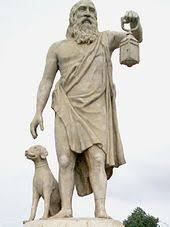
DIOGENES HO KYNICOS is one of the founders of Cynicism. Early in his life, he has a father who mints coins. The father soon finds himself in troubles with the law. Then Diogenes ends up in an unclear situation over the debasement of the currency. At the end he receives a ban from Sinope. So he decides to move to Athens. It is in the great city that he indulges in the opportunity of criticizing many cultural conventions and habits. In several ways he follows the example of Heracles (the divine hero). In fact he too shows that virtue is better revealed in action than in theory.
It does not take long for him to gain quite a negative reputation. Such an opinion comes from his custom of sleeping and eating when and where he likes. But he also performes many other patently unconventional and defiant actions. He begs for a living and he often takes a nap while staying in a big ceramic jar in the marketplace. Diogenes becomes known for carrying a lamp all day long. He claims that the lantern is necessary to look for an honest man (if any). He criticizes Platon (Plato), disputing his interpretation of Sokrates (Socrates). In fact, Diogenes takes the habit of sabotaging Platon’s lectures. The story goes that Diogenes sometimes tries to distract Platon’s listeners by eating along the discussions. Diogenes is also noted for having mocked Alexander the Great. So Diogenes ho Kynicos is one of the founders of Cynicism, even according to the current semantics of the term Cynicism.
One day Diogenes is captured by pirates and then sold into slavery, eventually settling in Corinth. He passes his philosophy to Kratēs ho Thēbaios (Crates), who teaches it to Zenon ho Kitieus (Zeno of Citium). It is Zenon who fashions the philosophy of Cynicism into the school of Stoicism, one of the most enduring schools. None of Diogenes’ writings survives, but there are some details of his life from anecdotes (<chreia>). The most meaningful stories come from Diogenes Laërtius’ book “Lives and Opinions of Eminent Philosophers“.